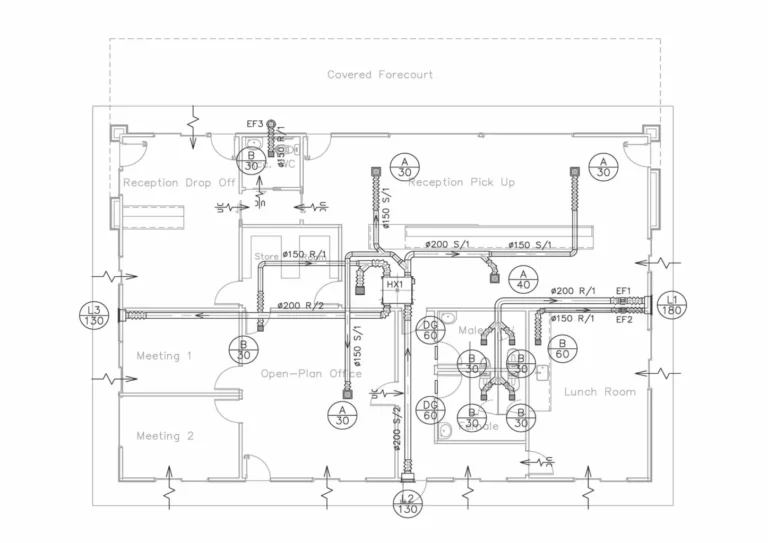All You Need To Know About An HVAC Design Engineer

Day-to-day activities
As an HVAC design engineer, your daily activities involve utilising your technical knowledge and skills to design and analyse the performance of HVAC systems. You will work closely with architects, general contractors, and other engineers to ensure that the system design meets the customer’s needs. Here are some of the day-to-day activities for an HVAC design engineer:
Designing HVAC systems
You will use computer-aided design (CAD) software to create detailed drawings of the HVAC system. These drawings are used to create the design documents that detail the components and their specifications. You will also be responsible for calculating the load requirements, selecting the appropriate components and sizing ductwork, piping, and other equipment.
Analysing System Performance
You will analyse the performance of HVAC systems by running simulations and testing the system in the field. This includes testing the system’s efficiency, static pressure, air flow, and other factors. You will also use advanced software to analyse the energy performance of the system, including the energy efficiency ratio (EER) and coefficient of performance (COP).
Inspecting and Troubleshooting
You will inspect existing systems to assess their condition and identify any potential problems. This includes looking for any signs of wear or damage, and assessing the overall performance of the system. You will also troubleshoot problems with existing systems and make recommendations for improvements.
Working with Contractors
You will work closely with contractors and other tradespeople to ensure that the system is installed correctly. This includes providing technical advice and support and reviewing the installation plans.
Research and Development
You will stay up-to-date with the latest HVAC technologies and innovations. This includes researching new products and technologies and testing them in the lab or in the field.
These are just a few of the day-to-day activities for an HVAC design engineer. As an HVAC design engineer, you will use your technical knowledge and skills to ensure that the system is designed and installed correctly, and that it meets the customer’s needs.
Qualifications
An HVAC Design Engineer is responsible for designing and developing systems for heating, ventilation, and air conditioning in buildings. This job requires a combination of engineering, technical, and design skills. To be successful in this role, an individual should have a good understanding of thermodynamics, fluid mechanics, computer-aided design (CAD) software, and building codes.
Education
A four-year bachelor’s degree in mechanical engineering is required to be an HVAC Design Engineer. Many employers prefer a master’s degree in mechanical engineering with an emphasis on HVAC design. During their studies, individuals should become familiar with thermodynamics, fluid mechanics, and computer-aided design (CAD).
Certification
In some states or countries, HVAC Design Engineers are required to be licensed or certified. The requirements can vary by place, but generally include passing a test and demonstrating a certain level of experience.
Skills and attributes
The field of heating, ventilation, and air conditioning (HVAC) engineering is a rapidly growing, complex industry. An HVAC design engineer is responsible for designing, testing, and installing HVAC systems, and they must possess a unique set of skills and attributes to be successful. Here are some of the most important skills and attributes of an HVAC design engineer:
Knowledge of Building Codes and Regulations
An HVAC design engineer must be familiar with all local and national building codes and regulations related to HVAC systems. They need to be knowledgeable about the different types of HVAC systems and components, as well as their design and installation requirements.
Technical Skills
An HVAC design engineer must be proficient in mathematics and physics, and have a good understanding of the principles of thermodynamics and fluid mechanics. They must also be knowledgeable about computer-aided drafting (CAD) and modelling software, as well as be able to use programming languages such as C++.
Problem-Solving Skills
An HVAC design engineer must be able to identify and solve problems related to HVAC systems. They must be able to analyse data and come up with solutions that are both cost-effective and energy-efficient.
Communication Skills
An HVAC design engineer must be able to effectively communicate with clients and other stakeholders. They must be able to explain complex technical concepts in a way that is understandable to non-technical personnel.
Leadership Skills
An HVAC design engineer must be able to lead a team of engineers, technicians, and other personnel. They must be able to effectively manage time and resources, and have the ability to delegate tasks and ensure that team members are working together.
Interpersonal Skills
An HVAC design engineer must be able to build relationships with clients and other stakeholders. They must be able to listen to their needs and come up with creative solutions.
These are some of the most important skills and attributes of an HVAC design engineer. With the right combination of technical knowledge, problem-solving skills, and interpersonal skills, an HVAC design engineer can be a valuable asset to any organisation.
Earning potential
The average salary for an HVAC design engineer in New Zealand is around NZ$75,000 per year. However, as with most jobs, the more experience and qualifications you possess, the more money you can make. Experienced engineers in the field can earn as much as NZ$120,000 per year.
In addition to a salary, there are also bonuses and other incentives that can be earned, such as performance-based bonuses and profit-sharing plans. Many companies also offer benefits such as health insurance and retirement plans.
Job satisfaction
Working as an HVAC design engineer can be rewarding as the work can be varied, interesting, challenging and creative. The role can involve a diverse range of projects, and many companies also offer technical and career development.
Get your business noticed by creating an online directory listing. Listings are FREE and you can create as many as you need.
- Get found by locals


